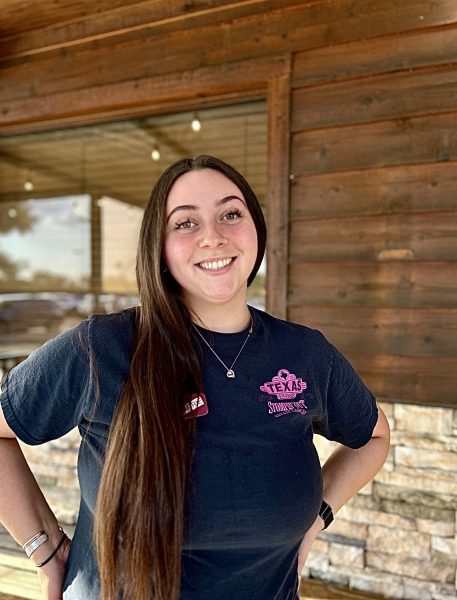In November, voters will face several important decisions on their ballot, including Proposition 138.
If approved, this measure would amend the Arizona Constitution to allow employers to pay tipped workers, including servers, hourly wages up to 25% below the minimum wage, as long as employees still earn at least the minimum wage plus $2 per hour when tips are included.
In simple terms, servers currently earn $11.35 per hour, which is $3 less than the minimum wage. Under the proposed change, their base pay would drop to $10.76 per hour, which is 25% less than the $14.35 minimum wage, with tips making up the difference.
It’s uncertain how this change will affect servers’ overall pay since tipping habits differ across restaurants. Whether Prop 138 helps or hurts their income will depend on how often tips make up for the lower base wage.
Carrie Phillips, a University of Arizona public health senior, is a part-time server at Texas Roadhouse.
“I will say that there are some people that think that we (servers) make too much, so they don’t tip us really well,” Phillips said. “We get paid every week, and our paychecks are like $200 if that. And that’s not much to live off of, especially now. If I just relied on my paycheck I would not be able to afford my apartment, my car, or anything. So I feel like if you even lower that even more, how are we supposed to afford anything really, right?”
At Texas Roadhouse, servers keep most of their tips but must share 3% based on sales, not actual tips. If customers don’t tip, servers still pay into the tip pool, meaning they can lose money when tables don’t tip at all. Phillips and her coworkers feel as though servers will suffer if Prop 138 passes.
“ I feel like servers will hate it, but it’s not going to change how we treat customers. If a customer comes in, we can’t tell if they wanted this or not,” Phillips said. “There are signs around Tucson saying, ‘make restaurants affordable, vote yes on Prop 138,’ but that doesn’t make sense to me because our salary has nothing to do with what the menu prices are. If the menu prices go down, we’re still going to get paid the same. If the menu prices go up, we’re still getting paid the same.”
Supporters, including the Arizona Restaurant Association, say Proposition 138 will help restaurants lower labor costs, potentially preventing the need to hike menu prices or add surcharges to cover higher wages. By cutting operating expenses, they argue, the measure could make dining out more affordable.
“I think a restaurant is a luxury service, it’s something that you pay for, for when you don’t want to cook and you’re being waited on,” Phillips said. “I feel like a lot of servers are going to quit if you pay us less.”

Hope Emmet, a UA veterinary science junior, is a server at the Gaslight Theatre. Emmet thinks that Prop 138 may not affect servers as much.
“I don’t think this will have a huge effect on my paychecks,” Emmet said. “Right now I make $11.35 an hour, and my shifts are usually seven hours. Tips are where I make most of my money. Usually I have 19 tables per show, and then they tip me however they see fit, but I have to tip out the runners and the bartenders, which is around 6 % of the tips I make.”
Relying heavily on tips for her income, Emmet believes a small 60-cent wage decrease won’t significantly affect servers’ paychecks. However, she’s concerned that tipping culture is spiraling out of control, with many customers forgetting how much their tips directly impact a server’s livelihood.

UA graduate student Jummana Tourky works at a restaurant at La Encantada mall; she has mixed feelings on how Prop 138 will affect her and her coworkers.
While a 60-cent decrease may seem minor, the shift to a percentage-based minimum wage difference means that as Arizona’s minimum wage rises, the gap will also widen, potentially amplifying its impact over time.
Arizona minimum wage is currently higher than the federal rate of $7.25 and many states, but still below places like Washington and California. It’s adjusted annually to match inflation.
“For me, this would not change how I interact with customers, especially because it’s only a 60-cent difference. But 60 cents is kind of a lot once you add it up hourly, right?” Tourky said. “But you still have to be nice to guests in order to get tips. So either way, it would just hurt me in the end to serve my customers differently.”
Arizona Sonoran News is a news service of the University of Arizona School of Journalism.




